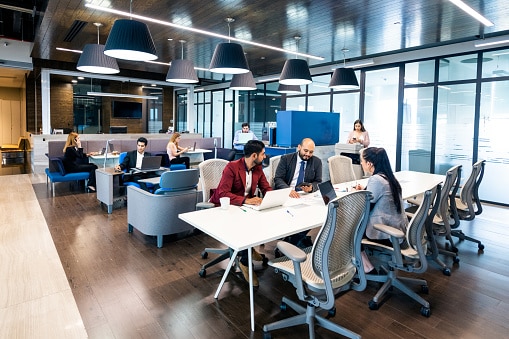Workplace hoteling, also known as “hot desking” or “hoteling,” is a flexible office arrangement in which employees do not have assigned desks or offices but instead reserve a workspace on an as-needed basis. This approach to office design can have both benefits and drawbacks. In this article, we will explore workplace hoteling’s five pros and cons in detail.

Pros of Workplace Hoteling
1. Cost Savings
One of the main benefits of workplace hoteling is cost savings for the company. Companies can save 20-30% real estate costs and reduce the square footage required for their office space without needing assigned desks or offices. Hot desking can be especially beneficial for businesses just starting out or those looking to scale down their office space. Companies can also save on furniture, equipment, and supplies, as employees can share these resources.
2. Increased Collaboration and Cross-Functional Teamwork
Another benefit of workplace hoteling is that it can lead to increased collaboration and cross-functional teamwork. When employees are not sitting in their assigned workspace, they are more likely to interact with and learn from their colleagues. Hotelling can lead to more creative problem-solving and a better understanding of the different roles and responsibilities within the company. Employees are also more likely to share ideas and perspectives, leading to more innovative solutions.
3. Flexibility
Workplace hoteling also provides employees greater flexibility regarding where and when they work. Hot desking can be especially beneficial for employees who travel frequently or prefer to work from home on certain days. Employees can reserve a workspace when needed with workplace hoteling, allowing them to work from anywhere, anytime. This flexibility can also help to improve employee satisfaction, as they are given the autonomy to choose their working environment.
4. Environmental Sustainability
Another benefit of workplace hoteling is that it can be more environmentally friendly. When employees are not assigned to a specific workspace, there is less need for lighting, heating, and cooling in unused areas, which can lead to energy savings. Additionally, it can reduce the consumption of paper and other company resources since employees will have to share them. Hoteling can reduce the company’s environmental footprint while promoting a more sustainable work culture.
5. Improved Organization
Workplace hoteling can also lead to improved organization within a business, as employees will be more likely to keep their workspaces clean and tidy when they are not the primary users. Hot desking can lead to a more productive and efficient work environment, as employees will have easy access to the resources they need. The company can also benefit from a more organized and efficient workspace, which is easier to manage and maintain.

Cons of Workplace Hoteling
1. Lack of Ownership and Belonging
One of the main challenges of workplace hoteling is that employees, to be productive, need to feel a sense of belonging. Without an assigned workspace, employees may feel they don’t have a “home base” in the office. Consequently, open-seating offices can lead employees to feel disconnected and isolated. Hot desking can be especially problematic for employees who spend significant time in the office and need a space to call their own.
2. Difficulty Focusing and Being Productive
Another potential drawback of workplace hoteling is that it can be difficult for employees to focus and be productive in a shared workspace. Without the privacy and personalization of an assigned desk or office, employees may feel constantly being watched or judged by their colleagues, which can be distracting and stressful. Open workplace environments can make it difficult for employees to complete their work, leading to decreased productivity. Productively working in an open office can be challenging without sufficient techniques to reduce office noise.
3. Privacy and Security
Workplace hoteling can also be challenging for employees to maintain their privacy and security. Employees may need to share computers and other devices with other employees, making it difficult for them to keep their personal information and work-related documents private. Open workplaces can be a concern for employees handling sensitive or confidential information.
4. Increased Spread of Germs and Illnesses
Additionally, workplace hoteling can increase the spread of germs and illnesses, as employees share common spaces and equipment. Hot desking can be especially problematic in the current pandemic, where hygiene and safety measures are crucial. Employers need to take extra steps, such as frequent cleaning and disinfecting of shared spaces to reduce the spread of germs.
5. Reduced Comfort and Motivation
Lastly, workplace hoteling can also cause employees to feel less comfortable and less motivated. Employees who are not assigned to a specific workspace may need more control over the lighting, temperature, or other factors that can impact their comfort and productivity. Hot desking can reduce employee satisfaction and motivation, negatively affecting the work environment.

Conclusion
In conclusion, workplace hoteling, also known as “hot desking” or “hotelling,” can provide cost savings and increased collaboration for companies. It also offers flexibility and environmental sustainability benefits for employees. However, it also has drawbacks, such as lack of ownership and belonging, difficulty focusing and being productive, privacy and security concerns, increased spread of germs, and reduced comfort and motivation. Employers should weigh the pros and cons of workplace hoteling and consider providing the necessary resources and support before adapting to this office arrangement. Additionally, measures can be taken to address the concerns and negative impacts, such as providing private spaces for employees and implementing strict hygiene and sanitation protocols. Overall, workplace hoteling can be a viable option for companies. Nonetheless, the method should be implemented thoughtfully and with the well-being of employees in mind.
We Open Doors For Our Clients
The physical workspace is more than just the one we can see, touch, taste, and smell. A workplace drives culture. We connect entrepreneurs, corporations, and nonprofits with spaces designed to propel institutional success.
Our commercial real estate agents consistently outperform the market in leveraging industry relationships and local expertise. We use our experience, specialized local knowledge, data analytics, and advanced negotiation tactics to achieve exceptional results.
Whether pursuing workspace or seeking maximum return on your investment, we provide optimal long-term value!


